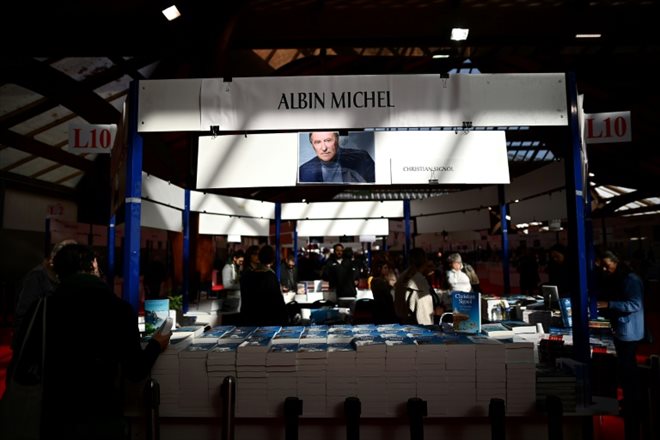The writer Christian Signol at the Brive Book Fair, in Brive-la-Gaillarde in Corrèze, November 10, 2023 (AFP/Christophe ARCHAMBAULT)
Ignored by the national press and TV shows, authors of regional literature retain a large readership, with their rural but not always ancestral stories, like Christian Signol, one of the French’s favorite novelists.
At the Brive Book Fair, the Corrèze author continues the signings, almost stealing the show from Amélie Nothomb or the last Prix Goncourt, Jean-Baptiste Andrea.
If the prestigious award sells an average of 400,000 copies, the man with 45 novels sells each of his large formats at 100,000 copies. Not counting the pocket editions.
Since “Les Cailloux Bleus”, in 1984, this lover of vanished times has sold 15 million books, all formats combined, and has been translated into 15 languages. At the inauguration of the fair on Friday, Culture Minister Rima Abdul Malak paid tribute to his 40-year career.
“My masterpiece is to last. I have established close ties with a very loyal readership by talking to them about them, about their families who have lived through great History”, explains the author of the ” Rivière Espérance”, which relates the rural world, also through its emptying villages or its municipal school.
His latest novel, “Une Famille Française”, (Albin Michel), traces the lives of three generations from 1950 to the present day, moving from the peasantry to the university.
– A reductive label –
This former companion of the Brive School – an editorial label created in the 1980s by Robert Laffont, with Claude Michelet – gets “annoyed” when he is labeled a “local author”.

The writer Christian Signol at the Brive Book Fair, in Brive-la-Gaillarde in Corrèze, November 10, 2023 (AFP/Christophe ARCHAMBAULT)
Faithful to the Dordogne valley, and to the nearby Quercy where he was born, he rather points out his visceral attachment to the “natural world”, to the “cycle of the seasons”, to “forests and rivers”, like the Americans Jim Harrison, William Faulkner or Norman MacLean, “considered peasant writers”.
For his readers met in Brive, his “delicate and humble” narration which “recalls the life of grandparents” and their “life of labor” captivates.
“Contempt” for the “Germanopratin” press or “vain classification of booksellers to place their novels on a shelf”? The regional label is a bit annoying for authors and publishers.
“You have to put your feet down somewhere,” sighs Jean-Paul Malaval. This prolific writer whose intrigues “about ordinary lives” nourish his inspiration in “wide open spaces and countries of solitude which have kept traces of the past”, “without nostalgia” or “cheap psychoanalysis”.
“We are opposed to generalist, +intellectual+ novelists? I don’t do +branle-neu-neu+”, squeaks the Ariégeois Georges-Patrick Gleize, author of rural thrillers anchored in current affairs and the Pyrenees.
All proudly display the loyalty of their readers “of all ages and backgrounds”.
Because the literary segment, which is suffering from the graying of its readership and the disappearance of the France Loisirs distribution network, “is holding its own” according to the publishers, with “one million copies sold in all formats each year”, according to Camille Lucet, director delegate of Calmann-Levy.
– Protean genus –

The stand of Albin Michel, who publishes Christian Signol, at the Brive Book Fair, in Brive-la-Gaillarde in Corrèze, November 10, 2023 (AFP/Christophe ARCHAMBAULT)
This publisher shares the market with Presses de la Cité and Albin Michel. Elise Fisher in Alsace-Lorraine, Françoise Bourdon in Provence, Didier Cornaille in Burgundy, Christian Laborie in the Cévennes, Joël Ragénès in Brittany: each region has its own figure, with works often republished and adapted for television.
“We are not in +Kleenex+ literature but in beautiful popular and protean literature,” defends Clarisse Enaudeau, literary director of Presses de la Cité.
In recent years, the segment has undergone significant renewal. New writers are particularly involved in cozy and comforting police intrigues (“cozy crime”) like Sylvie Baron in Cantal, Agathe Portail in Bordeaux, or Margot and Jean Le Moal between Brittany and Alsace.
“The challenge is to retain new readers but clichés die hard,” judges Alexandra Pastéris Boucher, publisher and manager of De Borée, praising the enthusiasm of booksellers.
New authors like Caroline Hussard (“The House of Dogs”) and Valériane Taront (“Fenêtre sur Jardin”), awarded prizes for their first works, are indifferent to categorization and are instead rejoicing “not to be drowned in the jungle” of the literary season.
© 2023 AFP
Did you like this article ? Share it with your friends using the buttons below.




